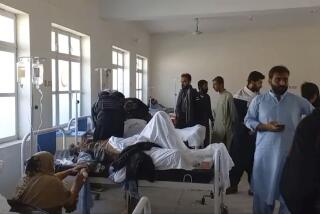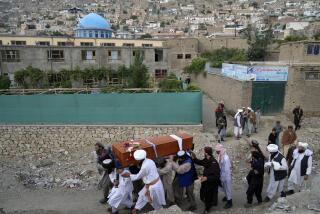Bomb Misses a Top Warlord in Afghanistan
- Share via
KABUL, Afghanistan — A bomber killed himself and wounded at least 23 people outside a mosque Thursday in an attack apparently aimed at a powerful Afghan warlord.
Ethnic Uzbek leader Abdul Rashid Dostum, who was attending a prayer service marking the beginning of the Muslim holiday of Eid al-Adha in northern Afghanistan, was not injured.
“Gen. Dostum and I had just bent down to put our shoes on after the prayer when we heard a deafening sound just a few feet away. Had we been standing up, I think we would have been injured too,” said Roz Mohammed Noor, governor of Jowzjan province, where the bombing occurred
Noor said about 10,000 people had gathered for early-morning prayers in an open field in Dostum’s hometown, Sheberghan. The governor said no one had been searched for weapons.
“We weren’t expecting any violence -- it was a religious event, after all,” he said. “But Gen. Dostum did have his security detail around him.”
A member of Dostum’s security team, who did not want to be identified, said the bomber was wearing explosives under his jacket and was trying to penetrate the ring of guards around the Uzbek leader but became frustrated and detonated his bomb early.
Nearly two dozen injured people were rushed to nearby hospitals and clinics. Late Thursday, two of them were reported to be in serious condition.
The bomber was not identified, but government officials said they were not immediately assuming that the attack was carried out either by the Taliban or Al Qaeda insurgents.
Dostum accumulated many enemies during his 25-year fighting career in Afghanistan as he changed sides often in the country’s many conflicts. In the early 1980s, he was a staunch supporter of the communist regime. But he later switched to the mujahedin rebels who eventually won the battle against Soviet occupation.
In the early 1990s, Dostum was a key player in the civil war that destroyed Kabul, the capital, and later committed himself to fighting the Taliban. He allied himself with the U.S. military in late 2001 to topple the Taliban regime.
At the peak of his power, Dostum controlled much of northern Afghanistan, which is dominated by ethnic Uzbeks. He had his own currency printed up and commanded a militia of almost 20,000 fighters.
He ran in the country’s presidential election late last year but came in fourth. The U.S.-backed candidate, Hamid Karzai, won the post.
Dostum has seen his influence wane in the last six months. He was not included in Karzai’s new Cabinet, and most of his militia is being disarmed and dissolved, as are other private armies.
Thursday’s attack coincided with the release of a rare statement attributed to Taliban leader Mullah Mohammed Omar, in which he said that his Islamic militia would not lay down its arms until all foreign soldiers were out of Afghanistan.
An estimated 18,000 U.S. troops are in the country, deployed for the most part to hunt Taliban and Al Qaeda fighters in the region along the border with Pakistan. In addition, 8,000 soldiers from about three dozen other nations are serving with the International Security Assistance Force, a peacekeeping group.
Omar’s statement came after Karzai and U.S. Ambassador Zalmay Khalilzad had indicated that amnesty would be offered to Taliban soldiers who wished to drop out of the rebel group’s lower ranks.
More to Read
Sign up for Essential California
The most important California stories and recommendations in your inbox every morning.
You may occasionally receive promotional content from the Los Angeles Times.













